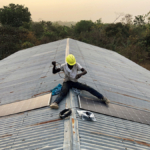
Ghana and Switzerland have jointly launched a $200 million National Clean Energy Programme (NCEP) to accelerate the deployment of rooftop solar systems across the country — marking Ghana’s first clean energy initiative implemented under Article 6 of the Paris Agreement.
The programme, spearheaded by the KliK Foundation in partnership with Ghana’s Environmental Protection Authority (EPA) and the newly named Ministry of Energy and Green Transition (MoEnGT), aims to promote affordable and inclusive renewable energy adoption in homes, small businesses, and industries.
At the launch event in Accra on Tuesday, October 29, Mr. Felix Addo-Okyeireh, Deputy Executive Director of the EPA, described the initiative as “a significant step forward in Ghana’s climate action and clean energy transition.”
“This programme is a tangible example of how Ghana is leveraging the international carbon market under Article 6 of the Paris Agreement. Through rigorous monitoring and reporting, we will ensure that all emission reductions are real, measurable, and credible,” Mr. Addo-Okyeireh said.
Under the NCEP, 137 megawatts (MW) of rooftop solar photovoltaic (PV) systems will be developed nationwide, amounting to about 4,000 installations of up to 1MW each. The project is expected to reduce greenhouse gas emissions, enhance energy security, and spur private-sector innovation in clean energy technologies.
Mr. Addo-Okyeireh explained that Ghana’s cooperation with Switzerland on carbon markets dates back to 2020, following the signing and parliamentary ratification of a bilateral climate agreement. This partnership, he said, has paved the way for multiple mitigation projects, including the newly launched rooftop solar programme.
Delivering an address on behalf of Mr. John Abdulai Jinapor, the Minister for Energy and Green Transition, the ministry said the NCEP aligns with Ghana’s broader energy transition goals.
“The global energy transition is accelerating, and Ghana is positioning itself to benefit. The National Clean Energy Programme supports our Energy Transition Framework and our NDC goals, while promoting innovation, job creation, and sustainable development,” the Minister said.
He noted that the Ministry has adopted its new name — Ministry of Energy and Green Transition — to reflect its expanded mandate to drive renewable energy adoption and climate-resilient energy policies.
According to Mr. Jinapor, Ghana’s National Energy Transition Framework (NETF) provides a roadmap to achieve net-zero emissions by 2070, with a target of 10% renewable energy integration by 2030 and near-universal electricity access. He added that a revised Renewable Energy Master Plan (REMP) will soon guide investments and partnerships between 2026 and 2030.
The Minister also underscored the importance of private sector involvement in the programme’s implementation. “The government cannot do this alone. We invite private investors, development partners, and innovators to join hands in building a cleaner, safer, and more prosperous Ghana,” he urged.
Ambassador Simone Giger, Switzerland’s Ambassador to Ghana, Benin, and Togo, commended Ghana’s commitment to clean energy transition and described the NCEP as a model for global climate cooperation.
She praised Ghana for achieving close to 90% electricity access, calling it a “remarkable milestone in inclusive development,” but noted that 64% of Ghana’s power generation still comes from fossil fuels, underscoring the urgency of diversifying the energy mix.
“Ghana is climbing the right tree — the tree of clean and sustainable energy — and Switzerland is proud to lend its push of support through partnership, investment, and shared expertise,” Ms. Giger said.
The NCEP is not only Ghana’s first rooftop solar PV programme under Article 6, but also the second of its kind globally — reinforcing the country’s leadership in climate cooperation and market-based carbon finance in Africa.
By combining international partnerships, private investment, and strong policy frameworks, Ghana’s government says it is positioning the country as a frontrunner in Africa’s clean energy transition and a model for sustainable development.